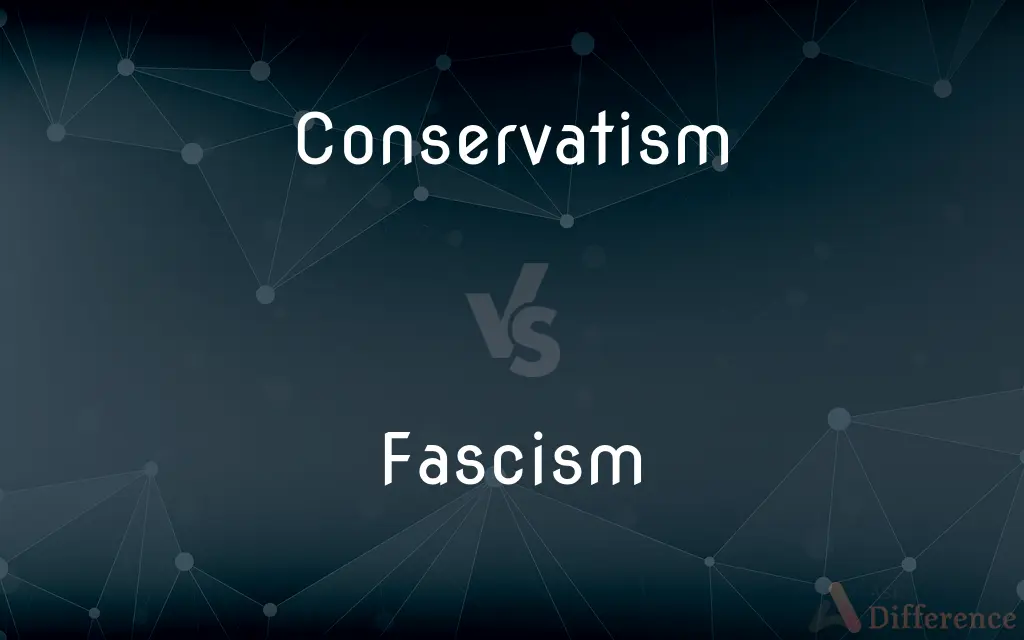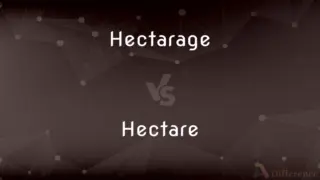Conservatism vs. Fascism — What's the Difference?
By Tayyaba Rehman & Fiza Rafique — Updated on April 19, 2024
Conservatism emphasizes tradition and stability, advocating minimal changes in society, while fascism imposes authoritarian rule and suppressive nationalism.

Difference Between Conservatism and Fascism
Table of Contents
ADVERTISEMENT
Key Differences
Conservatism is grounded in the desire to preserve existing social institutions and traditional values, often advocating for a slow and evolutionary change process. Fascism, on the other hand, seeks radical transformation of society under a totalitarian regime where nationalism and state power are aggressively promoted.
In conservatism, individual freedoms are generally respected as long as they align with traditional societal norms. Whereas fascism demands conformity to the state’s ideology, often curtailing individual rights and freedoms in the process.
Economic policies under conservatism typically support free-market principles, believing that less government intervention in business is beneficial for society. In contrast, fascism often incorporates a controlled economy where the government dictates major aspects of economic activity to serve national interests.
Conservatism usually functions within the framework of a democratic political system, valuing lawful transitions of power and the rule of law. Fascism, however, seeks to establish a one-party state with absolute power vested in a dictator or a ruling elite.
While conservatism can exist and thrive in various forms of government, fascism explicitly requires a centralized, authoritarian government to enforce its principles and suppress opposition.
ADVERTISEMENT
Comparison Chart
Core Principles
Tradition, stability, gradual change
Authoritarianism, nationalism, total control
Freedom
Respects individual freedoms within tradition
Curtails freedoms to enforce state ideology
Economic Policy
Supports free-market economy
Advocates controlled economy for national goals
Political System
Functions within democratic norms
Seeks one-party totalitarian rule
Government Role
Minimal in personal affairs, more in morality
Centralized and intrusive in all aspects
Compare with Definitions
Conservatism
Advocates for minimal changes in society.
Conservatism often resists rapid reforms in public education systems.
Fascism
A far-right authoritarian ultranationalist political ideology.
Fascism in 20th-century Europe led to totalitarian regimes.
Conservatism
Respects the rule of law and gradual political evolution.
Conservatism endorses lawful means for political transitions.
Fascism
Seeks to forge a uniform national community.
Fascism promotes aggressive propaganda to foster national unity.
Conservatism
A political philosophy promoting traditional values and institutions.
Conservatism supports the monarchical system in the United Kingdom.
Fascism
Imposes strict control over the economy.
Fascism dictates both production and distribution processes to serve state goals.
Conservatism
Emphasizes free-market economic policies.
Conservatism argues against excessive governmental regulation of businesses.
Fascism
Advocates for a one-party state with absolute power.
Fascism eliminates political opposition to ensure total control.
Conservatism
Values individual freedoms within the bounds of tradition.
Conservatism upholds religious freedom while promoting traditional family values.
Fascism
Suppresses individual freedoms for state ideology.
Fascism bans independent media to control the flow of information.
Conservatism
Conservatism is the aesthetic, cultural, social, and political outlook that embodies the desire to conserve existing things, held to be either good in themselves, or better than the likely alternatives, or at least safe, familiar, and the objects of trust and affection.The central tenets of conservatism may vary in relation to the traditions and values of the culture and civilization in which it appears. In Western culture, conservatives seek to conserve a range of things such as organized religion, property rights, parliamentary government, family values, the natural environment, and classical and vernacular architecture.
Fascism
Fascism () is a form of far-right, authoritarian ultranationalism characterized by dictatorial power, forcible suppression of opposition, and strong regimentation of society and of the economy, which came to prominence in early 20th-century Europe. The first fascist movements emerged in Italy during World War I, before spreading to other European countries.
Conservatism
The inclination, especially in politics, to maintain the existing or traditional order.
Fascism
An authoritarian and nationalistic right-wing system of government and social organization.
Conservatism
A political philosophy or attitude that emphasizes respect for traditional institutions and opposes the attempt to achieve social change through legislation or publicly funded programs.
Fascism
A system of government marked by centralization of authority under a dictator, a capitalist economy subject to stringent governmental controls, violent suppression of the opposition, and typically a policy of belligerent nationalism and racism.
Conservatism
Caution or moderation, as in behavior or outlook.
Fascism
A political philosophy or movement based on or advocating such a system of government.
Conservatism
A political philosophy that advocates traditional values.
Fascism
Oppressive, dictatorial control.
Conservatism
A risk-averse attitude or approach.
Fascism
Any right-wing, authoritarian, nationalist ideology characterized by centralized, totalitarian governance, strong regimentation of the economy and society, and repression of criticism or opposition.
Conservatism
The disposition and tendency to preserve what is established; opposition to change; the habit of mind; or conduct, of a conservative.
Fascism
Any system of strong autocracy or oligarchy usually to the extent of bending and breaking the law, race-baiting, and/or violence against largely unarmed populations.
Conservatism
A political or theological orientation advocating the preservation of the best in society and opposing radical changes
Fascism
Any extreme reliance on or enforcement of rules and regulations.
Fascism
A political theory advocating an authoritarian hierarchical government; - opposed to democracy and liberalism.
Fascism
An authoritarian system of government under absolute control of a single dictator, allowing no political opposition, forcibly suppressing dissent, and rigidly controlling most industrial and economic activities. Such regimes usually try to achieve popularity by a strongly nationalistic appeal, often mixed with racism.
Fascism
Specifically, the Fascist movement led by Benito Mussolini in Italy from 1922 to 1943.
Fascism
Broadly, a tendency toward or support of a strongly authoritarian or dictatorial control of government or other organizations; - often used pejoratively in this sense.
Fascism
A political theory advocating an authoritarian hierarchical government (as opposed to democracy or liberalism)
Common Curiosities
What is the main goal of conservatism?
To maintain stability and continuity in society through traditional values and institutions.
How do conservatism and fascism view individual rights?
Conservatism respects individual rights that align with traditional norms, while fascism often suppresses individual rights to strengthen state control.
How does fascism differ in its approach to national unity?
Fascism imposes a homogenized national identity, often through coercive means, whereas conservatism may support a more pluralistic national identity.
What economic models do conservatism and fascism support?
Conservatism generally supports a laissez-faire economic model, whereas fascism implements a controlled economy managed by the state.
What role does the military play in conservatism and fascism?
In conservatism, the military is primarily seen as a protective force for national defense and typically operates within the confines of civilian government oversight. In fascism, the military often plays a central role, heavily integrated into the governance and identity of the state, and may even be glorified as a symbol of national strength and unity.
Can conservatism exist within a fascist regime?
While both seek order and control, conservatism does not inherently require the authoritarian or totalitarian elements typical of fascism.
Is there any common ground between conservatism and fascism?
Both ideologies can exhibit tendencies towards nationalism and a preference for strong leadership. However, the extent and manner in which these tendencies are expressed differ significantly, with conservatism operating within the bounds of democratic norms and fascism employing authoritarian measures.
How do public and cultural expressions differ between conservatism and fascism?
In conservative societies, cultural expressions are often diverse but tied to historical and traditional values. Public expressions are moderated by social norms and legal constraints. In fascist regimes, cultural and public expressions are heavily monitored and controlled by the state, designed to enforce a unified ideological narrative and suppress dissent.
How do conservatism and fascism differ in their international outlook?
Conservatism typically supports a sovereign national state operating within an international order, where it may pursue its interests diplomatically. Fascism often harbors expansionist and imperialist ambitions, seeking to exert influence or control beyond its borders under the guise of national greatness or destiny.
How do conservatism and fascism address social change?
Conservatism generally prefers gradual, organic social change that maintains the continuity of cultural and historical traditions. Fascism, however, may advocate for abrupt and enforced social change to align society with a specific nationalist or ideological vision, often implemented through aggressive policies and propaganda.
Share Your Discovery

Previous Comparison
Hectarage vs. Hectare
Next Comparison
Approximation vs. InterpolationAuthor Spotlight
Written by
Tayyaba RehmanTayyaba Rehman is a distinguished writer, currently serving as a primary contributor to askdifference.com. As a researcher in semantics and etymology, Tayyaba's passion for the complexity of languages and their distinctions has found a perfect home on the platform. Tayyaba delves into the intricacies of language, distinguishing between commonly confused words and phrases, thereby providing clarity for readers worldwide.
Co-written by
Fiza RafiqueFiza Rafique is a skilled content writer at AskDifference.com, where she meticulously refines and enhances written pieces. Drawing from her vast editorial expertise, Fiza ensures clarity, accuracy, and precision in every article. Passionate about language, she continually seeks to elevate the quality of content for readers worldwide.














































